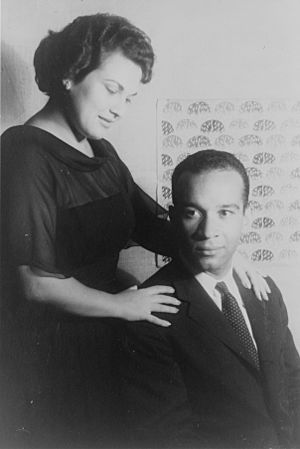Black conductors facts for kids
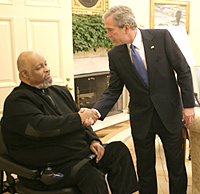
A conductor is a leader of a group of musicians, like an orchestra or choir. They use hand and arm movements to guide the musicians during classical music concerts or jazz big band performances. Conductors of African, Caribbean, or African-American backgrounds are sometimes called black conductors. For a long time, it was very rare to see black conductors leading major orchestras.
Contents
A Look Back: Black Conductors in History
The 1900s: Breaking Barriers
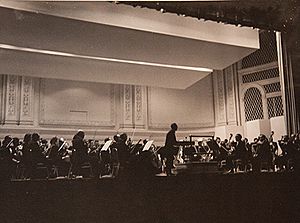
In the early 1930s, an African-American conductor named Dean Dixon (1915–1976) found it hard to get conducting jobs. This was because of unfair treatment based on race. So, he started his own orchestra and choir in 1931.
Later, in 1940, Dean Dixon, along with another African-American conductor, Everett Lee, and a Jewish-American conductor, Benjamin Steinberg, tried to create an orchestra of black musicians. This project didn't work out because they couldn't get enough money.
However, Benjamin Steinberg didn't give up. In 1964, he formed the Symphony of the New World. This was the first orchestra in the United States that had musicians of all races working together. Their first concert was held at the famous Carnegie Hall in New York City on May 6, 1965.
Everett Lee made history in 1945 when he became the first African American to conduct a big show on Broadway. A famous composer named Leonard Bernstein asked Lee to conduct his musical, On the Town. This was the first time a black conductor led a show with an all-white cast. In 1953, Lee was also the first black musician to conduct a white symphony orchestra in the southern United States. Two years later, in 1955, he became the first musician of color to conduct a major opera company in the US.
In the early 1950s, a powerful music manager named Arthur Judson told Everett Lee that a black conductor could not lead a white orchestra in the US. Judson said that black musicians could play solo parts or sing in white productions, but leading the whole orchestra was not seen as possible at that time.
William Grant Still conducted the New Orleans Philharmonic Orchestra in 1955. This made him the first African American to conduct a major orchestra in the Deep South of the US. Henry Lewis (1932–1996) was the first African-American to lead a major symphony orchestra. He also performed at the famous Metropolitan Opera in 1972. Henry Lewis shared that it was hard for him to be seen as an authority figure as a conductor because of the racial attitudes of the time.
James Frazier won an important conducting award in Italy in 1969. In the 1970s, he conducted several important orchestras around the world. Sadly, he passed away young in 1981. Isaiah Jackson (born 1945) became the first black principal conductor of The Royal Ballet in London in 1986.
The 2000s: Continuing the Journey
Even in the early 2000s, black conductors were still rare in classical music. A Canadian-born black conductor named Kwamé Ryan made his professional debut in 2004. Ryan has spoken about how young black people, especially in North America, are often encouraged to become athletes or pop stars, but not conductors. He believes there aren't enough black conductor role models, and this lack of exposure continues from one generation to the next.
Famous Black Conductors
Classical Music Conductors
Most classical music conductors throughout history have been white. However, a small but important group of conductors of African, Caribbean, or African-American heritage have made a big impact:
- Charles-Richard Lambert (died 1862) was an American musician and conductor. He was known for his musical talent and led the Philharmonic Society in New Orleans.
- William Grant Still (1895–1978) was a very important composer and conductor. He was one of the first African Americans to conduct a major American symphony orchestra in the Deep South. He also had a symphony performed by a leading orchestra and an opera performed by a major opera company. He wrote over 150 musical pieces.
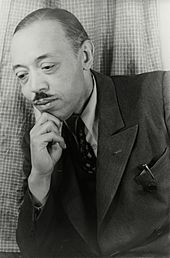
- Everett Lee (1916–2022) was a violinist who became a conductor. He was the first African American to conduct a major Broadway show. He also conducted the New York Philharmonic and led orchestras in Europe.
- Leonard De Paur (1914–1998) studied at the Juilliard School. He was an assistant conductor and later led many groups, including the De Paur Infantry Chorus. He helped start the Lincoln Center Out of Doors Festival in New York City.
- Dean Dixon (1915–1976) formed his own orchestra because of racial unfairness. He later guest-conducted famous orchestras like the NBC Symphony Orchestra and the New York Philharmonic. He received awards for his work in music.
- Dr. Anne "Georgianne" Lundy (born 1954) was the first African-American woman to conduct the Houston Symphony Orchestra. She founded the William Grant Still String Quartet and the Scott Joplin Chamber Orchestra. These groups focus on performing music by black composers.
- Henry Lewis (1932–1996) joined the Los Angeles Philharmonic at age 16, becoming the first black instrumentalist in a major symphony orchestra. He later became the first African-American to lead a major symphony orchestra.
- James DePreist (1936–2013) was one of the first African-American conductors to become famous worldwide. He was chosen by Leonard Bernstein to be an assistant conductor for the New York Philharmonic.
- Paul Freeman (1936–2015) founded the Chicago Sinfonietta and was a music director for the Czech National Symphony Orchestra. He conducted many orchestras around the world.
- Isaiah Jackson (born 1945) was the first African-American to be a music director in the Boston area. He also became the principal conductor of The Royal Ballet in London, being the first black and first American to hold that top position.
- Calvin E. Simmons (1950–1982) was one of the early African-American conductors of a major orchestra. He became the music director of the Oakland Symphony Orchestra at just 28 years old.
- Leslie Dunner (born 1956) is an American conductor and composer. He is known for connecting with audiences through many different music styles. He conducted the Detroit Symphony Orchestra.
- Michael Morgan (1957–2021) was the music director of the Oakland East Bay Symphony. He won an international conducting prize and was chosen by Sir Georg Solti to be an assistant conductor for the Chicago Symphony Orchestra.
- Jeri Lynne Johnson is the founder of the Black Pearl Chamber Orchestra, the first multi-ethnic professional orchestra in Philadelphia. In 2005, she became the first African-American woman to win an international conducting award.
- Kwamé Ryan (born 1970) is a Canadian conductor of Trinidadian background. He has conducted at the Edinburgh International Festival and was music director of the Orchestre National Bordeaux Aquitaine in France.
- Marcus Alleyne (born 1983) is a British conductor with Caribbean heritage. He is one of the few professional black conductors in the UK, working with many groups and performing in famous halls.
- Marlon Daniel is an American conductor known for his work with music by composers of African descent. He has conducted in many famous concert halls around the world.
- John McLaughlin Williams is the first African-American to win a Grammy Award for orchestral conducting. He was a violinist before becoming a conductor and is known for recording many American symphonic pieces.
Jazz and Popular Music Conductors
In jazz and popular music, the leader of a band is often called a bandleader.
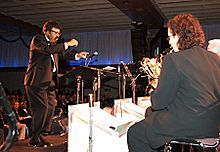
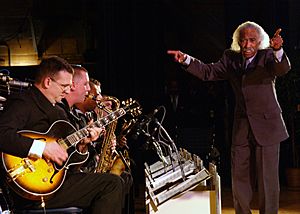
- David Baker (born 1931) was an American jazz composer and bandleader. He taught at Indiana University and has many recordings, books, and articles to his name.
See also
- List of principal conductors by orchestra
 | Laphonza Butler |
 | Daisy Bates |
 | Elizabeth Piper Ensley |


